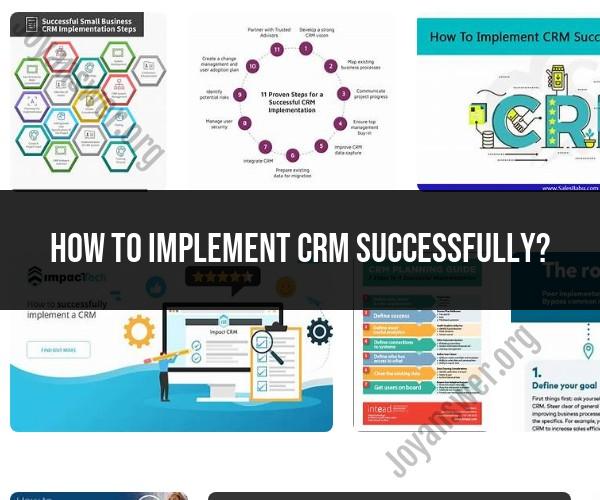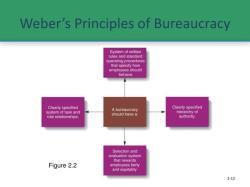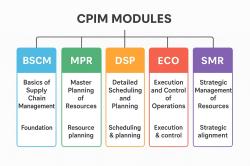How to implement CRM successfully?
Implementing Customer Relationship Management (CRM) successfully requires careful planning, commitment, and a well-structured approach. CRM implementation can significantly improve your organization's ability to manage customer relationships, streamline processes, and boost sales. Here are the essential steps and considerations for a successful CRM implementation:
1. Define Your Objectives:
- Start by clearly defining your CRM goals and objectives. What do you aim to achieve with CRM? Common objectives include improving customer service, increasing sales, enhancing marketing efforts, and streamlining processes.
2. Get Stakeholder Buy-In:
- Ensure that key stakeholders, including senior management, sales teams, marketing teams, and customer service representatives, are aligned with the CRM implementation. Their support and involvement are crucial for success.
3. Select the Right CRM Software:
- Choose a CRM solution that aligns with your organization's needs and goals. Consider factors such as scalability, integration capabilities, ease of use, and cost. Cloud-based CRM solutions are popular due to their flexibility and accessibility.
4. Customize and Configure:
- Tailor the CRM system to meet your specific requirements. Customize fields, workflows, and reporting to align with your business processes. Ensure that the CRM captures the data you need to make informed decisions.
5. Data Migration and Cleansing:
- Clean and migrate existing customer data into the CRM system. Accurate and up-to-date data is essential for CRM success. Develop data quality standards and practices to maintain clean data over time.
6. Training and Education:
- Provide comprehensive training to all users who will interact with the CRM system. Ensure they understand how to use the CRM effectively for their roles. Training should be an ongoing process to accommodate staff turnover and system updates.
7. Pilot Testing:
- Conduct a pilot test with a small group of users to identify any issues or areas for improvement. Address any issues and refine processes before rolling out the CRM to the entire organization.
8. Integration with Existing Systems:
- Ensure that the CRM system integrates seamlessly with other existing software and systems, such as email, marketing automation, and ERP systems. Integration enhances data flow and efficiency.
9. Define Workflows and Automation:
- Map out your organization's customer processes and define workflows within the CRM system. Implement automation where possible to streamline repetitive tasks, such as lead nurturing and follow-ups.
10. Monitor and Measure:- Continuously monitor the CRM system's performance and user adoption. Use key performance indicators (KPIs) to measure progress toward your objectives. Adjust and refine processes based on data and feedback.
11. User Feedback and Improvement:- Encourage users to provide feedback on their CRM experience. Use this feedback to make necessary improvements and enhancements to the system. A CRM system should evolve to meet changing business needs.
12. Data Security and Compliance:- Ensure that customer data is secure and compliant with relevant data protection regulations (e.g., GDPR, HIPAA). Implement access controls and encryption to protect sensitive information.
13. Change Management:- Recognize that CRM implementation involves a change in how your organization operates. Effective change management strategies, including communication and training, are essential to overcome resistance to change.
14. Ongoing Support:- Provide ongoing technical support and a helpdesk for CRM users. Address issues promptly to minimize disruptions to daily operations.
15. Celebrate Success and Recognize Achievements:- Celebrate milestones and achievements along the CRM implementation journey. Recognize and reward teams and individuals who contribute to the system's success.
Successful CRM implementation is an ongoing process that requires commitment and continuous improvement. By following these steps and considering these key considerations, organizations can harness the full potential of CRM to enhance customer relationships, drive growth, and improve operational efficiency.
Successful CRM Implementation: Key Strategies for Effective Adoption
A successful CRM implementation is one that is adopted by the entire sales team and used to its full potential. There are a few key strategies that can help to ensure the successful adoption of a CRM system:
- Get buy-in from the sales team. It is important to get the sales team on board with the CRM system from the very beginning. Explain the benefits of the system and how it can help them to be more successful.
- Provide training on the CRM system. Make sure that the sales team has adequate training on how to use the CRM system. This training should cover all aspects of the system, from basic navigation to more advanced features.
- Customize the CRM system to meet the needs of the sales team. The CRM system should be customized to meet the specific needs of the sales team. This includes configuring the system to track the right data and to generate the reports that the sales team needs.
- Make the CRM system easy to use. The CRM system should be easy to use and navigate. This will make it more likely that the sales team will use the system on a regular basis.
- Provide support for the sales team. The sales team should have access to support if they have any questions or problems with the CRM system. This support can be provided in the form of online documentation, email support, or phone support.
CRM Success Blueprint: Implementing Customer Relationship Management
Here is a blueprint for implementing customer relationship management (CRM) successfully:
- Define your goals. What do you want to achieve with CRM? Do you want to improve customer satisfaction, increase sales, or reduce costs? Once you know your goals, you can develop a plan to achieve them.
- Choose the right CRM system. There are many different CRM systems available, so it is important to choose one that is right for your business. Consider the size of your business, your industry, and your budget when choosing a CRM system.
- Implement the CRM system. Once you have chosen a CRM system, you need to implement it. This includes configuring the system, migrating data, and training your employees.
- Use the CRM system. Once the CRM system is implemented, you need to use it. This means entering data into the system, using the system to track customer interactions, and generating reports.
- Analyze the results. Regularly analyze the results you are getting from the CRM system. This will help you to see if you are achieving your goals and to identify areas where you can improve.
CRM Implementation Excellence: Steps to Ensure Success
Here are some steps you can take to ensure the success of your CRM implementation:
- Get executive buy-in. CRM implementation is a strategic initiative, so it's important to get the support of senior management. Make sure they understand the benefits of CRM and are committed to its success.
- Create a project plan. A well-defined project plan will help you stay on track and avoid pitfalls. Be sure to include a timeline, budget, and list of key tasks.
- Choose the right team. Assemble a team of experienced and knowledgeable people to help you implement CRM. This team should include representatives from sales, marketing, customer service, and IT.
- Communicate with your team and stakeholders. Keep your team and stakeholders informed of your progress and any changes to the plan. This will help ensure everyone is on the same page and working towards the same goals.
- Test and train. Before you launch the CRM system, be sure to test it thoroughly and train your team on how to use it. This will help ensure a smooth transition and minimize disruption to your business.
By following these steps, you can increase your chances of success when implementing a CRM system.












